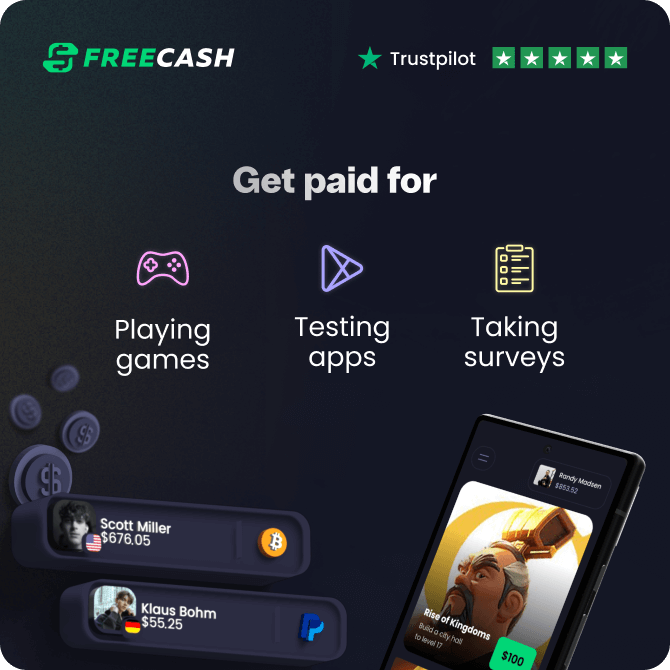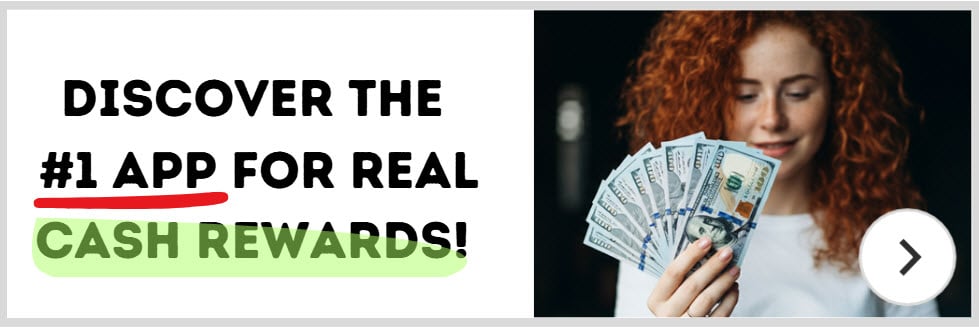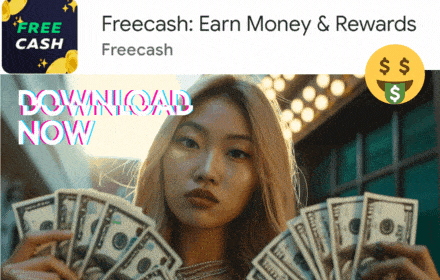Picture this: You’re scrolling through your social media feed or playing a casual game when an eye-catching video ad starts.
In the advert, a woman bounces with joy as she observes her virtual cash balance skyrockets!
It culminates in her PayPal account being bombarded with a torrent of $100 transactions and a “get rich” button.
You can almost feel the crisp bills between your fingers, excitedly planning how to spend your newfound fortune.
If you found the game late at night, you probably assumed that counting dollars would be more fun than counting sheep.
So, you decided that playing the game was worth the sacrifice of a few Z’s
Long story short, you were hooked, and now there is no way to turn back… You will do whatever it takes to withdraw your funds!
But as you dive deeper into the game, it feels like you are chasing a carrot, perpetually one step ahead of you.
This scenario is all too common, with millions worldwide lured in by the promise of easy money!
The question is: How do you spot these fake cash games before they steal your time and dignity?
In this post, we’ve compiled a comprehensive guide to help you distinguish between legit opportunities and scams.
We’ll show you the red flags to watch out for, from unrealistic cash rewards and limited-time offers to hidden withdrawal requirements and psychological manipulation.
So, hold tight because this will be an enlightening odyssey into deceptive gaming.
First, let’s understand how these developers make money. After that, their strategies to achieve their goal will make perfect sense!
How Do Developers Profit With Fake Money Games?
The primary method developers use to monetize their games is advertising.
Developers can maximize revenue by enticing users to play, collect virtual cash, and reach specific requirements.
The reason is that they are getting paid for those banners and video views.
Fake money games may also collect user data, such as demographics, location, and in-game behavior.
This data is valuable to advertisers and marketing agencies and can be sold by developers for additional profit.
Some game developers are even charging transaction fees as a condition for players to receive their cash prizes.
This is like paying for the privilege of being tricked!
Misleading Advertising
It all starts with deceptive advertising to entice people into installing the fake money game!

This reward platform is going viral! Cash out via PayPal, Visa, Gift Cards, and in-game currencies - Click here to find out how to generate an extra $10+ per day!
One common method is using PayPal logos and images of unrealistic cash transfers.
That gives the impression that these games offer quick and easy financial rewards.
Advertisements frequently feature people with expensive cars, iPhones, Gucci bags, and piles of cash, creating a sense of luxury that’s hard to resist.
Developers often make bold claims, such as making hundreds of dollars per day.
“Just download now and earn a $100 bonus.”
They also entice users by claiming features such as “no withdrawal limit,” “instant transfer via PayPal,” and “no ads.”
This makes users believe they can cash out large sums effortlessly and creates a sense of security as PayPal is widely trusted.
Most people don’t realize these adverts often include a small disclaimer: “Results not guaranteed.”
This small print protects developers legally in case someone tries to sue them.
By incorporating this small print, they can argue that they never explicitly promised users the advertised rewards.
However, that may not be enough to avoid liability since companies must comply with advertising regulations.
Unrealistic Cash Rewards
A major red flag that can signal a bogus cash game is the promise of unrealistic cash rewards.
They all lure players with the prospect of earning hundreds, if not thousands, of dollars quickly.
Who doesn’t want to earn a job-replacing income with just a few taps on their screen?
It’s essential to understand how developers generate revenue so you can grasp how absurd those rewards truly are.
These gaming apps make money through advertisements by partnering with network companies.
They ensure a steady revenue stream in exchange for displaying sponsored content within the game.
However, such revenue sources wouldn’t even sustain 1% of the exorbitant payouts they boast about.
That’s because each sponsored video you watch generates only a few cents!
So, basically, they are trying to convince you they can transform pennies into gold coins… just like turning water into wine!
Early Access
Be cautious whenever you see a game with thousands of installations and no reviews!
Those apps are probably classified as “early access,” meaning they are still under development.
More recently, Google removed the “early access” label that once followed an app’s title, making it even easier for developers to fool you!
What’s concerning here is that users cannot publish their reviews for such games, making it hard to gauge their legitimacy.
So, it’s pretty common to see games with over 100k installs and no ratings whatsoever.
Honest game developers often use the “early access” status for a short time to gather valuable user feedback before the official launch.
However, unscrupulous developers use it permanently as a smokescreen for fake cash games.
Since players cannot share their experiences, potential users can’t learn from others’ mistakes.
As a result, they end up installing the game without knowing no one is getting paid.
That’s why you should only install reward applications that are 100% transparent and fully launched.
High Payout Threshold
Another key strategy of fake money games is setting high minimum withdrawal thresholds, such as $100, $500, or $1000.
Gamers are enticed to keep playing in the hopes of reaching these amounts and cashing out their earnings.
Of course, this creates a false sentence of achievement.
As people invest more time and approach the payout threshold, it makes it harder for them to accept the possibility that rewards might be fake.
That’s when the developer will exploit even further the natural human desire for easy money by decreasing your rewards.
That’s what we will cover in the next section.
Diminishing Rewards
In the beginning, players are rewarded with substantial cash amounts that encourage them to play more. It’s like the old carrot on a stick!
To collect the virtual dollars, players must trigger the promotional video by tapping the “claim,” “receive,” or “collect” buttons.
Everyone hates them, right? But what if they are a condition for collecting all those fantastic prizes?
However, the rewards gradually decrease as players progress in the game and approach the payout threshold.
This psychological manipulation keeps players trapped in a cycle of playing and watching more videos.
They think: “I’m so close to reaching the goal. I’ve already invested so much time and effort into this, and I can’t give up now when I’ve come this far.”
Scarcity Tactic: Beware of Limited-Time Offers!
Ah, the classic countdown bait!
These games often claim all the cash you collect within a 24-hour window will be redeemed to your PayPal account.
The goal is to create a sense of urgency, preying on your fear of missing out on a once-in-a-lifetime opportunity to earn lots of money.
In other words, it’s designed to make you act quickly without pausing to consider the offer’s legitimacy.
However, they usually allow players to cash out once they meet a specific threshold, typically $1000.
Contrary to what one might think, many players do eventually hit the $1000 mark. B
t here’s where it gets tricky. Reaching that amount is one thing; withdrawing it is another story entirely.
That’s where the classic bait-and-switch tactic comes into play, which you’ll likely encounter next.
Hidden Hidrawal Requirements
The next tip for spotting fake money is the hidden requirements, or the “bait and switch” tactic as I like to call it.
Developers may allow players to finally reach the payout threshold after a grueling period of gameplay.
However, once you think you’ve made it and press the cash-out button, the app introduces a hidden requirement.
Typically, they ask you to watch many videos to activate the order. It can vary anywhere between 5 to over 80 videos!
As you complete this new requirement, it feels like you’ve jumped through enough hoops, and now you really deserve the reward.
But here comes yet another set of requirements to smash your sandcastle.
The developer prolongs the gameplay by continually moving the goalposts and sinks the player further into the illusion.
Those highly committed to cash out refuse to accept they were fooled, not to mention the time they lost.
I call it psychological warfare!
Transaction Fees?
Another sign of a fake money game is when they ask you to pay a transaction fee.
Cunningly, they’ll entice you with the promise of skipping the agonizing waiting time to receive cash rewards.
Or they may also offer this as an alternative to watching many videos. But beware, dear reader, for this is a trap!
Do not, under any circumstances, open your wallet in such situations because there is no way to ask for a refund.
Legitimate reward apps would never ask users to pay to receive their cash rewards.
Requests for personal information
Beware of requests for personal information, dear users!
Developers of fake money games often have a section for you to enter your account details, such as your PayPal account twice, along with other information.
In this process, it’s too easy for people to inadvertently enter sensitive data, like passwords or other sensitive information.
But here’s the real cause for concern: many apps don’t encrypt user data, leaving your precious information vulnerable and exposed.
In a world where privacy is paramount, and identity theft is rampant, this lack of security is irresponsible and dangerous.
So, when using any app, especially those promising easy money, it’s crucial to be cautious.
Don’t submit your details until you determine whether the game is legit or fake. Better safe than sorry!
No Terms of Service
Most fake money games don’t provide the User Agreement (aka Terms of Service), which outlines the rules and conditions for using the app.
This omission is a significant red flag, suggesting that the developers want to keep users in the dark about their rights and obligations.
A legitimate app typically offers transparent terms and conditions to foster trust.
So, when an app leaves you guessing, I’d better keep your distance!
Clone of Popular Games
Yet another way to spot fake money games is by recognizing their resemblance to popular casual games.
These imitations often lack quality and creativity, shamelessly cloning well-known titles to lure in unsuspecting users.
Think Candy Crush-style, tile-matching, idle games, and countless other genres that have been repackaged for deception.
Why bother investing time and resources in developing a unique game from scratch?
iPhones, AirPods, and other Gadgets!
These games also seduce you with high-end gadgets like iPhones, MacBooks, AirPods, PlayStations, and more.
They are led to believe that by collecting enough items and watching the videos, they will eventually redeem these prizes.
Clearly, they are trying to capitalize on our desire to own the latest tech products!
Conclusion
The world of fake money games is a treacherous one, filled with deception and false promises.
These cunning developers exploit our dreams of easy wealth, luring us into their psychological manipulation and time-wasting traps.
But fear not, dear reader, because knowledge is power!
With the insights shared in this article, you are now equipped to spot the red flags and avoid the pitfalls of these predatory apps.
Remember, genuine opportunities exist, but they require discernment and vigilance.
Final Words
Thanks for joining us on this eye-opening journey into the world of fake money games.
We’d love to hear your thoughts, experiences, and questions in the comment box below.
Peace!


